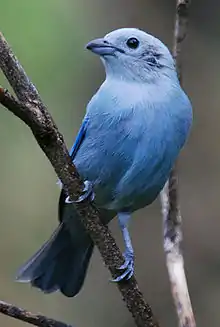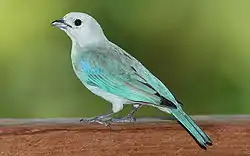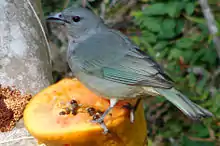Thraupis
Thraupis is a genus of birds of the tanager family occurring from Mexico to Argentina. Some are familiar species with large ranges.
| Thraupis | |
|---|---|
 | |
| Blue-grey tanager | |
| Scientific classification | |
| Kingdom: | Animalia |
| Phylum: | Chordata |
| Class: | Aves |
| Order: | Passeriformes |
| Family: | Thraupidae |
| Genus: | Thraupis F. Boie, 1826 |
| Type species | |
| Tanagra onarta Sparrman, 1789 | |
| Species | |
|
See text | |
These tanagers are mainly found in semi-open habitats including plantations and open woodland, but some will venture into towns. They feed from medium to high levels in trees, taking mainly fruit, with some nectar, and insects which may be taken in flight. The pair builds a usually well concealed cup nest, but the female incubates alone. The blue-gray and palm tanagers will nest in buildings. Thraupis tanagers have squeaky call notes and songs which consist of 5-10 repetitions of a single or double note.
Taxonomy and species list
The genus was introduced by the German naturalist Friedrich Boie in 1826 with the golden-chevroned tanager as the type species.[1][2] The name of the genus is the Ancient Greek word for an unidentified small bird mentioned by Aristotle.[3]
The genus formerly included the blue-and-yellow tanager and the blue-capped tanager. These were moved to other genera based of the results of molecular phylogenetic studies.[4][5][6]
The genus contains seven species.[7]
| Image | Scientific name | Common Name | Distribution |
|---|---|---|---|
 | Thraupis episcopus | Blue-grey tanager | Mexico south to northeast Bolivia and northern Brazil, all of the Amazon Basin |
 | Thraupis sayaca | Sayaca tanager | Brazil and Bolivia, Paraguay, Uruguay, and northeastern Argentina |
 | Thraupis glaucocolpa | Glaucous tanager | Colombia and Venezuela |
 | Thraupis cyanoptera | Azure-shouldered tanager | Brazil |
.jpg.webp) | Thraupis abbas | Yellow-winged tanager | Gulf of Mexico and Caribbean coasts from the states of Veracruz and the extreme south of San Luis Potosí in Mexico through the Yucatán Peninsula to Nicaragua, and on the Pacific coast from the Mexican state of Chiapas to Honduras |
 | Thraupis ornata | Golden-chevroned tanager | Brazil |
.jpg.webp) | Thraupis palmarum | Palm tanager | Nicaragua south to Bolivia, Paraguay and southern Brazil |
References
- Boie, Friedrich (1826). "Generalübersicht". Isis von Oken (in German). Col 974.
- Paynter, Raymond A. Jr, ed. (1970). Check-list of Birds of the World. Volume 13. Cambridge, Massachusetts: Museum of Comparative Zoology. p. 318.
- Jobling, J.A. (2018). del Hoyo, J.; Elliott, A.; Sargatal, J.; Christie, D.A.; de Juana, E. (eds.). "Key to Scientific Names in Ornithology". Handbook of the Birds of the World Alive. Lynx Edicions. Retrieved 2 April 2018.
- Sedano, Raul E.; Burns, Kevin J. (2010). "Are the Northern Andes a species pump for Neotropical birds? Phylogenetics and biogeography of a clade of Neotropical tanagers (Aves: Thraupini)". Journal of Biogeography. 37 (2): 325–343. doi:10.1111/j.1365-2699.2009.02200.x.
- Burns, K.J.; Shultz, A.J.; Title, P.O.; Mason, N.A.; Barker, F.K.; Klicka, J.; Lanyon, S.M.; Lovette, I.J. (2014). "Phylogenetics and diversification of tanagers (Passeriformes: Thraupidae), the largest radiation of Neotropical songbirds". Molecular Phylogenetics and Evolution. 75: 41–77. doi:10.1016/j.ympev.2014.02.006.
- Burns, K.J.; Unitt, P.; Mason, N.A. (2016). "A genus-level classification of the family Thraupidae (Class Aves: Order Passeriformes)". Zootaxa. 4088 (3): 329–354. doi:10.11646/zootaxa.4088.3.2.
- Gill, Frank; Donsker, David, eds. (2018). "Tanagers and allies". World Bird List Version 8.1. International Ornithologists' Union. Retrieved 2 April 2018.
External links
| Wikimedia Commons has media related to |